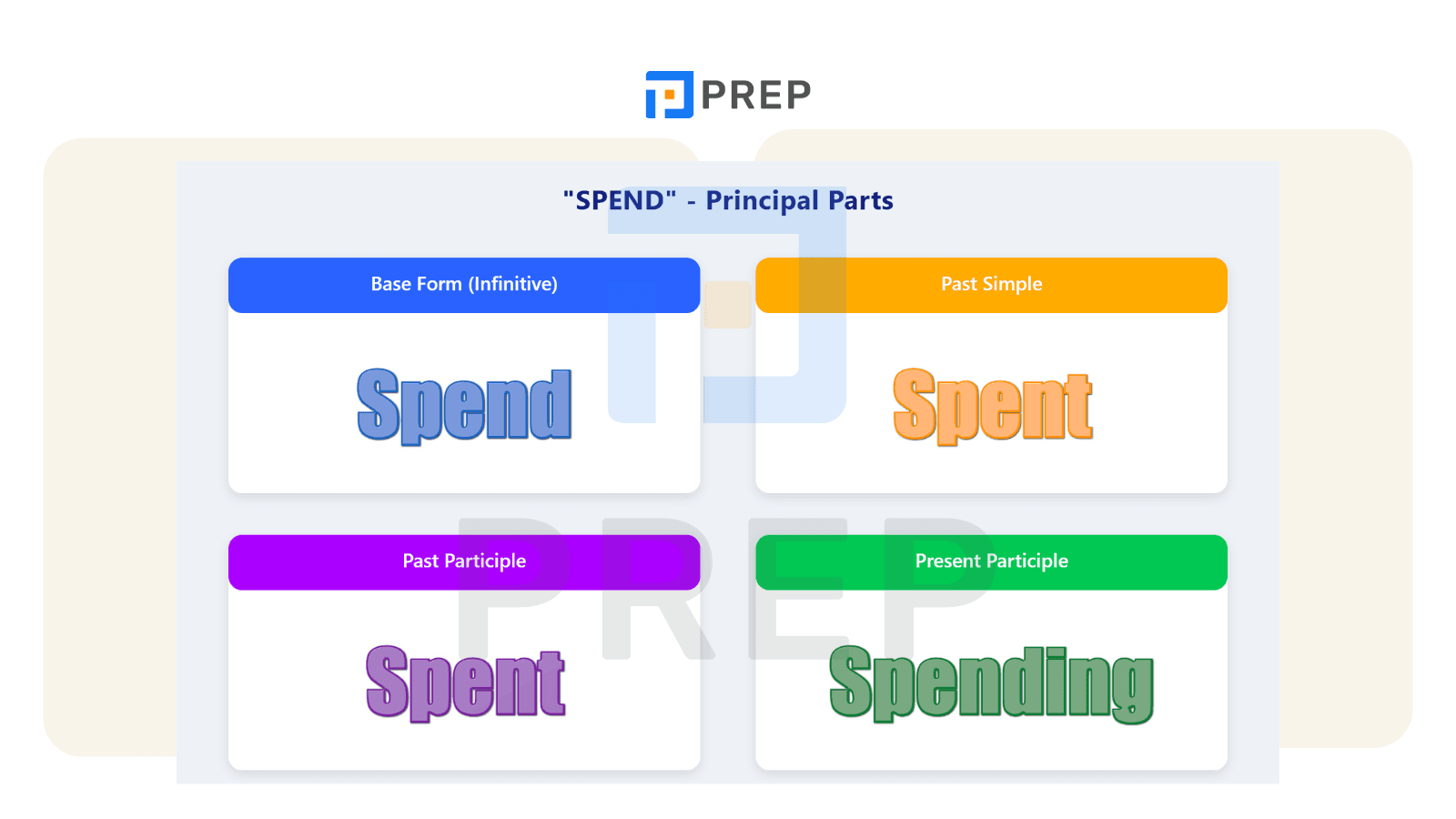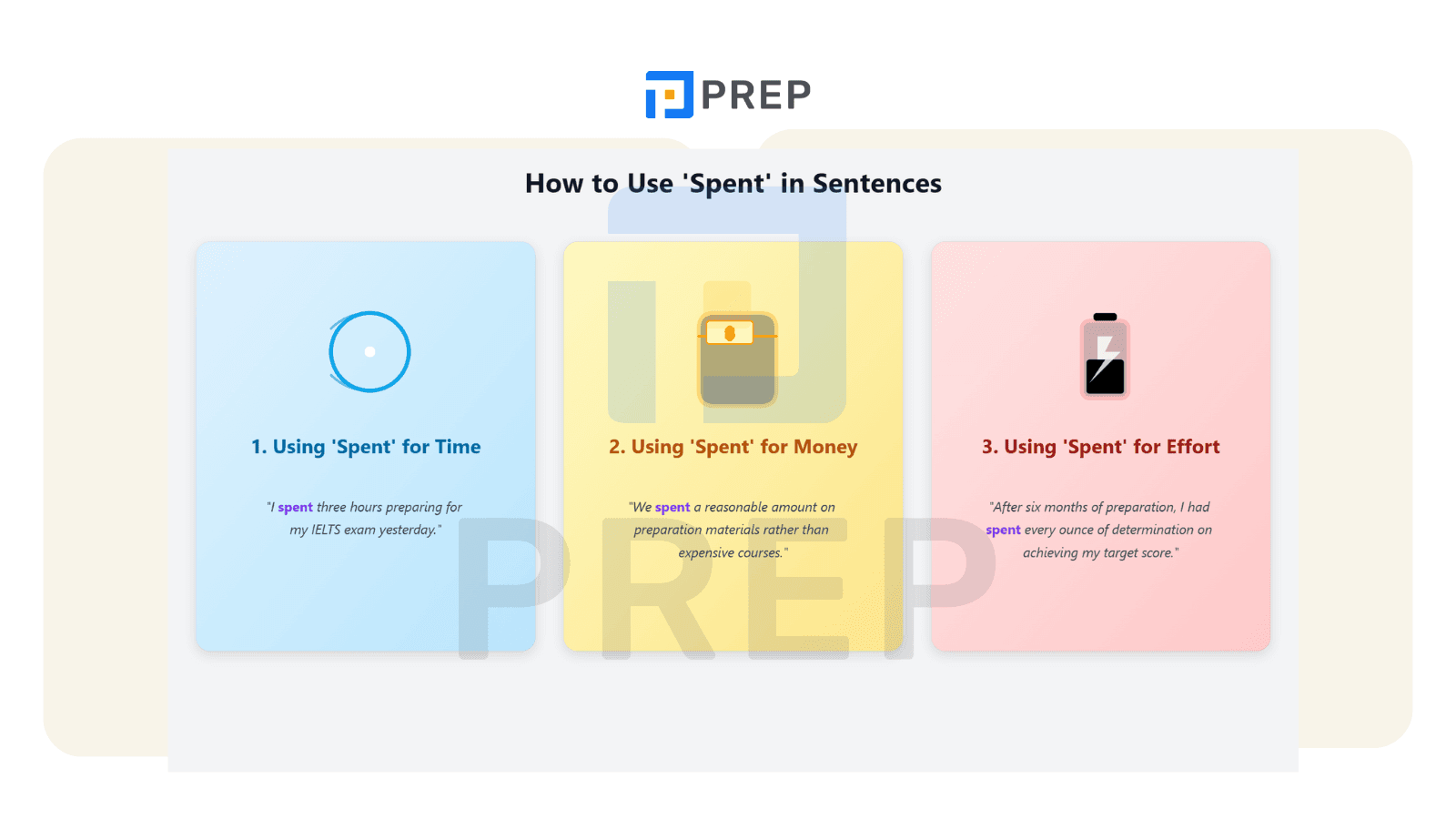Past Tense of Spend: Understanding and Correctly Using 'Spent'
This article provides a comprehensive explanation of the past tense of Spend, which is "spent." It systematically covers the irregular verb pattern, principal parts of the verb, common usage contexts (time, money, effort), typical collocations, common mistakes, and deeper grammatical insights. The content is structured to progress from basic information to more nuanced understanding, with clear examples and explanations of why "spent" is correct while "spended" is incorrect. The article maintains an educational tone while addressing practical applications in language learning contexts.
- 1. The past tense of Spend - 'Spent'
- 2. Define Spend: Understanding the Core Meaning
- 3. Principal parts of the verb 'Spend'
- 4. How to use 'Spent' in sentences
- 5. Common collocations with 'Spent'
- 6. Common mistakes when using 'Spent'
- 7. Frequently asked questions & deeper dives into the verb 'Spend'
- 7.1 Is 'Spent' used exclusively as a Simple Past Tense?
- 7.2 What makes a verb "Irregular" like 'Spend'?
- 7.3 Which other verbs follow the same pattern as 'Spend'/'Spent'?
- 7.4 What's the grammatical difference between "Time Spent" and "I Spent Time"?
- 7.5 Why is correct usage of 'Spent' important in language exams?
- 8. Conclusion

1. The past tense of Spend - 'Spent'
When you need to express the action of spending in the past, the correct form to use is spent. This is true whether you're discussing time, money, or energy. The verb spend belongs to a category of words that don't follow the standard pattern of adding "-ed" to form the past tense. Instead, spend transforms into spent when discussing actions that occurred in the past.
Note: The form “Spended” is incorrect and should never be used. This error typically occurs when English learners mistakenly treat "spend" as a regular verb by adding "-ed." Remember that spend belongs to the irregular verb category, so spent is the only correct past tense form.
2. Define Spend: Understanding the Core Meaning
To fully grasp the past tense of spend, we must first understand what is spend in its basic form. The spend meaning in English encompasses using or paying out resources, typically falling into three categories:
-
Using money for purchases or payments
-
Allocating time for activities or purposes
-
Investing effort or energy into tasks or goals
3. Principal parts of the verb 'Spend'
Understanding all the principal parts of "spend" will help you use it correctly in various tenses and grammatical structures. These forms serve as building blocks for constructing different expressions across past, present, and future timeframes.
3.1. Base Form (Infinitive): Spend
The infinitive "to spend" represents the verb in its most basic form.
3.2. Past Simple Tense: Spent (Reiteration for clarity)
The simple past tense spent describes completed actions that occurred at a specific time in the past.
3.3. Past Participle: Spent (Highlighting it's the same as past simple)
The past participle spent looks identical to the simple past form but fulfills different grammatical functions. This form appears in perfect tenses with helping verbs (have, has, had) and in passive voice constructions. The past participle of spend is essential for forming perfect tenses.
3.4. Present Participle (-ing form): Spending
The -ing form "spending" creates continuous tenses and can function as a verbal noun (gerund).

4. How to use 'Spent' in sentences
The past form of spend applies to three main contexts: time, money, and effort. Each usage follows specific patterns that enhance natural expression in English.
1. Using 'Spent' for past actions involving time
When discussing how time was allocated in the past, "spent" becomes your essential verb. It indicates the duration dedicated to an activity or purpose.
-
I spent three hours preparing for my IELTS exam yesterday.
-
She spent the entire weekend exploring the city's museums.
-
Most students spent at least 45 minutes on that challenging reading passage.
-
Time was spent efficiently during our intensive grammar workshop.
2. Using 'Spent' for past actions involving money
Financial transactions and monetary allocations in the past require the past tense "spent." This usage typically indicates purchases or investments.
-
The department spent $5,000 (approximately £3,900) on new language learning software.
-
He spent nearly all his savings on private English lessons before the test.
-
We spent a reasonable amount on preparation materials rather than expensive courses.
3. Using 'Spent' for past actions involving effort or energy
"Spent" also describes the expenditure of mental or physical resources in the past, conveying dedication and investment of personal energy.
-
The research team spent considerable energy developing the new language acquisition method.
-
She spent her mental resources mastering phrasal verbs rather than memorizing word lists.
-
After six months of preparation, I had spent every ounce of determination on achieving my target score.

5. Common collocations with 'Spent'
Speaking English naturally requires more than knowing individual words—it demands understanding which words commonly go together. These word partnerships, called collocations, make your language sound authentic. Here are the most frequent combinations with "spent."
5.1 Collocations related to Time
The verb "spent" frequently pairs with specific time-related phrases that sound natural to native speakers:
-
Spent time on (studying grammar)
-
Spent time doing (practicing speaking skills)
-
Spent hours/days/weeks/months (preparing for the exam)
-
Spent the morning/afternoon/evening/weekend (reviewing vocabulary)
-
wisely spent time
5.2 Collocations related to Money
Financial contexts feature these common patterns with "spent":
-
Spent money on (language courses)
-
Spent a fortune on (private tutoring)
-
well spent (referring to money that provided good value)
-
Spent savings/budget/allowance
5.3 Collocations related to Effort
When discussing the investment of energy, these combinations appear frequently:
-
Spent effort on (improving pronunciation)
-
Spent energy doing (completing practice tests)
-
Spent resources on (developing specific skills)
6. Common mistakes when using 'Spent'
Even advanced English learners occasionally struggle with the verb "spend" and its past forms. Being aware of these common errors will help you avoid them in your own speaking and writing.
6.1. Using 'Spended' instead of 'Spent'
As emphasized earlier, "spended" does not exist in standard English. This error stems from incorrectly categorizing "spend" as a regular verb. Always use spent for past actions, never "spended."
6.2. Confusing Spend Past Simple - 'Spent' with Spend Past Participle - 'Spent'
Though identical in form, these serve different grammatical functions:
-
Simple Past (I spent): Used alone for completed past actions
-
Past Participle (I have spent): Used with auxiliary verbs in perfect tenses
-
Past Participle (Money was spent): Used in passive voice constructions
Mixing these uses can create grammatically incorrect sentences. Compare: "I spent five hours studying yesterday." (correct simple past) "I have spent five hours studying today." (correct present perfect)
6.3. Using incorrect prepositions after 'Spent'
The verb "spend" requires specific prepositions depending on context:
-
Correct: spend money on something (not "for" something)
-
Correct: spend time on/doing something
-
Correct: spend effort on something
Incorrect preposition use sounds unnatural: "I spent money for a textbook" should be "I spent money on a textbook."

7. Frequently asked questions & deeper dives into the verb 'Spend'
7.1 Is 'Spent' used exclusively as a Simple Past Tense?
No, "spent" serves multiple grammatical functions. While it is the simple past tense of "spend," it also functions as the past participle in perfect tenses ("I have spent three years studying English") and passive voice constructions ("The money was spent wisely"). Understanding these multiple roles helps avoid confusion in complex sentence structures.
7.2 What makes a verb "Irregular" like 'Spend'?
An irregular verb changes its form in unpredictable ways when shifting between tenses, rather than following the standard pattern of adding "-ed" or "-d." These irregularities typically result from historical language evolution and must be memorized individually since they don't follow consistent modern rules. The transformation of "spend" to "spent" exemplifies this irregular pattern.
7.3 Which other verbs follow the same pattern as 'Spend'/'Spent'?
Several English verbs follow a similar pattern, ending with "-end" in the present and "-ent" in the past. Notable examples include:
-
send → sent
-
lend → lent
-
bend → bent
-
mend → mended (this one is regular, unlike the others)
Recognizing this pattern group can help you memorize these related irregular verbs together.
7.4 What's the grammatical difference between "Time Spent" and "I Spent Time"?
"Time spent" is a noun phrase where "spent" functions as a past participle adjective modifying "time." It describes the quality or state of the time. In contrast, "I spent time" is a subject-verb-object sentence where "spent" serves as the main verb (in past tense) and "I" is performing the action. The first structure describes while the second narrates.
7.5 Why is correct usage of 'Spent' important in language exams?
Proper use of "spent" demonstrates command of irregular verb forms, tense consistency, and idiomatic expression—all key assessment areas in exams like IELTS, TOEFL, and Cambridge assessments. Examiners specifically look for accurate verb form usage as an indicator of language proficiency. Using incorrect forms like "spended" immediately signals a lower proficiency level and can significantly impact scoring in grammar and vocabulary assessment categories.
8. Conclusion
Mastering irregular verb forms like "spent" represents a crucial milestone in your English language journey. While it might seem like a small detail, using the correct past tense demonstrates your attention to grammatical precision and indicates a higher level of language proficiency.
In academic contexts, professional communications, and everyday conversations, these subtle distinctions mark the difference between basic and advanced language skills. When you confidently use past tense of spend - "spent" instead of incorrectly saying "spended," you signal to others that you've internalized English's structural patterns beyond surface-level rules.

Hi I'm Chloe, and I am currently serving as an Product Content Administrator at Prep Education. With over five years of experience in independent online IELTS study and exam preparation, I am confident in my ability to support learners in achieving their highest possible scores.
Comment
Premium content
View allPersonalized roadmap
Most read












